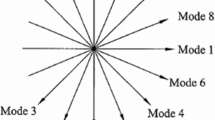Abstract
H.264 adopts new coding tools such as intra-prediction, variable block size, motion estimation with quarter-pixel-accuracy, loop filter, etc. The adoption of these tools enables an H.264-coded bitstream to have more information compared with previous standards. In this paper we proposed an effective spatial error concealment method with low complexity. Among the information included in an H.264-coded bitstream, we use prediction modes of intra-blocks for recovering a damaged block. This is because a prediction direction in each prediction mode is highly correlated to the edge direction. We first estimate the edge direction of a damaged block using prediction modes of intra-blocks adjacent to a damaged block and classify the area inside a damaged block into the edge and the flat area. And then our method recovers pixel values in the edge area using edge-directed interpolation, and recovers pixel values in the flat area using weighted interpolation. Simulation results show the proposed method yields better video quality than conventional approaches.
Preview
Unable to display preview. Download preview PDF.
Similar content being viewed by others
References
Wang, Y., Zhu, Q.F., Shaw, L.: Maximally Smooth Image Recovery in Transform Coding. IEEE Trans. Communication 41, 1544–1551 (1993)
Lee, X., Zhang, Y.Q., Leon-Garcia, A.: Information Loss Recovery for Block-based Image Coding Techniques-a Fuzzy Logic Approach. IEEE Trans. Image Processing 4, 259–273 (1995)
Park, J.W., Kim, J.W., Lee, S.U.: DCT Coefficients Recovery-based Error Concealment Technique and its Application to the MPEG-2 Bit Stream Error. IEEE Trans. Circuits and Systems for Video Technology 7, 845–854 (1997)
Sun, H., Kwok, W.: Concealment of Damaged Block Transform Coded Images Using Projections into Convex Sets. IEEE Trans. Image Processing 4, 470–477 (1995)
Alkachouh, Z., Bellanger, M.G.: Fast DCT-based Spatial Domain Interpolation of Blocks in Images. IEEE Trans. Image Processing 9, 729–732 (2000)
Park, J., Park, D.C., Marks, R.J., El-Sharkawi, M.A.: Recovery of Image Blocks Using the Method of Alternating Projections. IEEE Trans. Image Processing 14, 461–474 (2005)
Wiegand, T.: Version 3 of H.264/AVC. Doc. JVT-K051 (2004)
JM 10.1 (2005), http://bs.hhi.de/~suehring/tml/download/jm101.zip
Author information
Authors and Affiliations
Editor information
Editors and Affiliations
Rights and permissions
Copyright information
© 2006 Springer-Verlag Berlin Heidelberg
About this paper
Cite this paper
Kim, D., Kim, S., Jeong, J. (2006). Spatial Error Concealment with Low Complexity in the H.264 Standard. In: Blanc-Talon, J., Philips, W., Popescu, D., Scheunders, P. (eds) Advanced Concepts for Intelligent Vision Systems. ACIVS 2006. Lecture Notes in Computer Science, vol 4179. Springer, Berlin, Heidelberg. https://doi.org/10.1007/11864349_39
Download citation
DOI: https://doi.org/10.1007/11864349_39
Publisher Name: Springer, Berlin, Heidelberg
Print ISBN: 978-3-540-44630-9
Online ISBN: 978-3-540-44632-3
eBook Packages: Computer ScienceComputer Science (R0)




